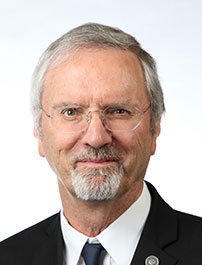Keynote Session
Enhanced Geothermal Systems: New Approaches Using Multistage Fracturing
- Prof. Roland Horne
- Stanford University

Biography
Roland N. Horne is the Thomas Davis Barrow Professor of Earth Sciences and Professor of Energy Science and Engineering at Stanford University, and Director of the Stanford Geothermal Program. He was the Chairman of the Department of Petroleum Engineering at Stanford from 1995 to 2006. He served on the International Geothermal Association (IGA) Board and was the 2010-2013 President of IGA. He was Technical Program Chairman of the World Geothermal Congress 2005 in Turkey, 2010 in Bali, Melbourne in 2015, and in Iceland in 2020-2021. Roland is a member of the US National Academy of Engineering and an Honorary Member of the Society of Petroleum Engineers. He is also a Fellow of the School of Engineering, University of Tokyo and an Honorary Professor of China University of Petroleum – East China.
Introduction of the Lecture
Geothermal energy has undergone a renaissance over the past 15 years, as many new technologies and new countries have joined the industry. Climate change concerns have focused attention on renewable energy, supported by a global ambition to address greenhouse gas reduction, leading to the acceleration of geothermal developments in many parts of the world. Some new developments have followed well-worn paths using conventional hydrothermal resources in volcanic regions, while others have struck out in new directions in Enhanced Geothermal System (EGS) projects. This talk will focus on recent developments in EGS that have launched in innovative directions not commonly applied previously in geothermal applications, specifically: (1) the use of horizontal wells with multistage fractures, (2) the use of proppant, (3) improved drilling strategy to reduce drilling time and cost. Examples will be drawn from the FORGE project in Utah, and the Fervo projects in Nevada and Utah, USA.


